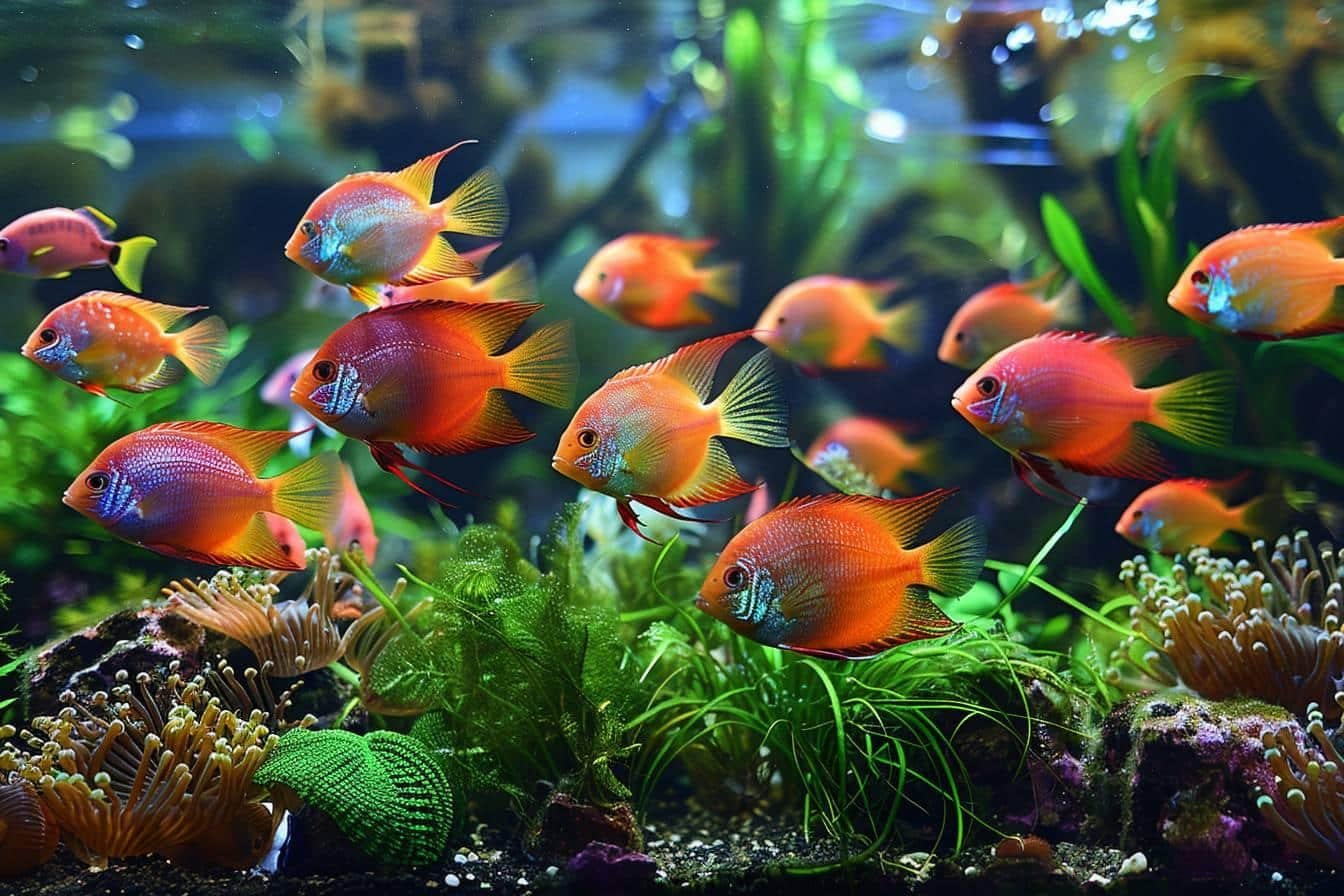The article in brief
Breeding discus, the kings of the tropical aquarium, is a delicate art requiring passion and expertise. Here are the key points:
- Unique features Disc-shaped, brightly coloured, fromAmazon
- Demanding breeding conditions Warm water (28-30°C), pH 6.0-6.8, spacious aquarium of at least 300-350 litres
- A varied diet Omnivorous diet with a preference for animal food
- Social behaviour Gregarious fish, to be kept in groups of at least 5 individuals.
- Complex reproduction The ultimate challenge for experienced aquarists
Ah, discus! These magnificent freshwater fish fascinate aquarists the world over. With their distinctive discus shape and brilliant colours, they are real living gems. As a keen aquarist for over 15 years, I never tire of observing these captivating creatures. Let me guide you through the secrets of breeding discus, the kings of the tropical aquarium.
The unique characteristics of discus
Le discus is a truly extraordinary fish. Native to the warm, fresh waters of Amazonia, it belongs to the cichlid family. Its flattened shape and majestic fins give it a regal appearance in the aquarium.
Morphology and size
The body of the discus fish is compressed laterally, forming an almost perfect disc. As adults, they generally reach a size of 15 to 20 cm. I was lucky enough to see some particularly imposing specimens in aquariums on display, and it was truly impressive!
Natural habitat
In the wild, discus live in the calm, shady waters of the Amazon's tributaries. They appreciate areas rich in roots and aquatic vegetation, which provide them with shelter and food. In the aquarium, it is necessary to recreate this environment for their well-being.
Social behaviour
Discus are gregarious fish par excellence. Both in the wild and in captivity, they form structured groups. A minimum of 5 individuals is recommended to observe their fascinating interactions. I have always marvelled at the way they communicate with each other through subtle changes in colour and posture.
The delicate art of discus breeding
Breeding discus is a real challenge, even for experienced aquarists. These demanding fish require special care and constant attention. But believe me, it's well worth the effort!
Ideal water conditions
Discus are very sensitive to water parameters. Here is a summary table of optimal conditions:
| Parameter | Ideal value |
|---|---|
| Temperature | 28-30°C |
| pH | 6,0-6,8 |
| Hardness (GH) | 3-7°dGH |
Keeping these parameters stable is essential. I remember once neglecting a weekly water change, and nearly losing my entire group of discus. Since then, I've been absolutely rigorous about aquarium maintenance!
Aquarium layout
A discus aquarium needs to be spacious and well laid out. Here are a few essential points:
- Minimum volume of 300-350 litres for a genset
- Decoration with roots and natural plants (cryptocorynes, anubias, echinodorus)
- Powerful filtration without strong current
- Moderate lighting
Don't hesitate to create shady areas and hiding places. Discus love to take refuge in these areas when they feel stressed.
Balanced diet
Discus are omnivores, with a preference for food of animal origin. In my aquarium, I offer them a varied menu:
- Flaked food for discus
- Protein-rich granules
- Frozen mosquito larvae
- Live artemia (a real treat for them!)
I recommend feeding them several times a day in small quantities. It's a bit restrictive, but it's worth it if you want to see their colours come into their own.

Cohabitation and reproduction: the ultimate challenges
If you want to take the experience even further, discus cohabitation and reproduction will provide you with some great challenges. This is not for beginners!
Choosing flatmates
Discus are peaceful fish that get on well with other calm species. The best companions include neons, red noses, ramirezi and corydoras. I've even managed to get my discus to cohabit with bettaBut you need to be vigilant and observe their interactions carefully.
The challenge of reproduction
Discus reproduction is a real challenge tour de force. It requires very specific conditions and a great deal of patience. The most interesting aspect is undoubtedly the parental behaviour: the young feed on the mucus secreted by their parents! It's a unique spectacle that I've only been lucky enough to observe once in 15 years of aquarium keeping.
Health and longevity
With proper care, discus can live up to 15 years in an aquarium. However, they are susceptible to disease, especially if the water quality is not optimal. Constant monitoring and regular water changes (15-30% per week) are essential to prevent health problems.
Discus, a passion to be cultivated
Breeding discus is much more than just a hobby - it's a real adventure! These demanding fish will require you to perfect your aquarium skills and develop a real discipline. But what a reward when you see these magnificent creatures flourishing in their environment!
If you're up to the challenge, the fascinating world of discus awaits you. Remember, patience and perseverance are your best allies. And who knows? Maybe one day, like me, you'll be lucky enough to witness the birth of baby discus in your own aquarium. Believe me, it's a magical moment that's worth all the effort in the world!
Sources :
wiki aquaculture
wiki fish farming
